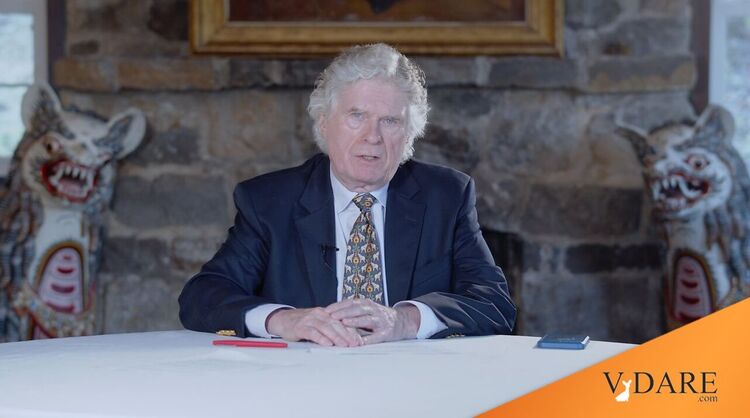On the immigration beat, which I have covered for nearly a quarter of a century, some things never change.
Among them are Haiti, the New York Times and its advocacy journalism that knows no limits.
One thing that helps me in my column writing is that despite my headlong slog into old age, my memory remains pretty good when it comes to the most outrageous violations of journalism ethics.
Following the Haiti earthquake, and the non-stop efforts of the Main Stream Media to open America to an unlimited number of Haitians, I recalled an article published in the New York Times Magazine on June 18, 2000.
Titled "Desperate Passage," it's the tale told by then-National Geographic contributing editor Michael Finkel's and Times photographer Chris Anderson's journey from Haiti to the United States with 46 other Haitian passengers on a 23 feet long boat powered only by two sails. [Desperate Passage, by Michael Finkel, New York Times Magazine, June 18, 2000(PDF)] [VDARE.com note: Paul Nachman met Finkel in 2006. See Speaking Up In A "Nation of Immigrants" Audience]
The Haitian's mission was the same in 2000 as it is today: "to start a new life" in America.
At the time, according to Finkel, Haiti was suffering through an unusually acute economic crisis. More than 80 percent of the population lived in "abject conditions" with the annual per capita income hovering around $250. Only one in 50 Haitians had a job.
In February 2000, the State Department released the results of a survey conducted in nine Haitian cities. According to the findings, two-thirds of Haitians—then approximately 4,690,000 people—would leave Haiti if given the means and opportunity.
Most would have had to go illegally, however, since each year the United States issued about 10,000 immigration visas to Haitian citizens, fulfilling one-fifth of 1 percent of the estimated demand.
Early into Finkel's article, at least one of his major points was clear: the U.S. needed to issue more visas to Haitians.
Before going further with my analysis of Finkel's article, let me point out the obvious that during the elapsed decade nothing at all has changed in Haiti. In ten years, Haitian living conditions haven't improved and the desire to get out is unabated.
Nevertheless, Finkel provided important insights into the depth of corruption involved in getting Haitians to America.
Typically, a successful journey is made in two parts. In the first, a boat sails from Haiti to the Bahamas. Before continuing for Florida, passengers normally work for several months cleaning hotel rooms or picking crops to save the $3,000 for 90-minute the power boat trip from the Bimini Islands to Broward Beach. These boats are often piloted by unscrupulous Americans who are drawn by the high pay rate for the limited time involved.
Only the fortunate make it all the way to Florida.
Sometimes on the first leg, the ship's captain merely takes his travelers once around the Haitian side of Hispaniola, drops them in a deserted area and proclaims that they've landed in the Bahamas.
The less lucky are left to fend for themselves in an uninhabited part of Haiti while the least lucky are dumped into the Atlantic Ocean shortly after departure and abandoned to drown.
To facilitate his trip, Finkel hired "David" for $30 daily to act as his translator and guide.
As it happened, David had been to America before. His mother had been issued a visa and she immediately summoned her three sons and her sister to Naples, Florida.
Given an opportunity to pursue "a better life," here's what David did with it:
- Soon after David's mother died (of AIDS), he "fell into bad company" and at age 17 spent nine months in jail for stealing a car.
- At 19, he served another stretch of a year and five days for selling marijuana that finally got him deported.
- In Naples, David's friends had called him "Six-Four," a nickname he said, he earned because of his penchant for stealing 1964 Chevy Impalas.
David confided to Finkel that if he ever returned to Naples he would be compelled to revert to his "Six-Four" persona in order to afford the cost of Florida living.
The Finkel-David tale continued.
After numerous delays in the launch time, "Captain Gilbert" finally appeared, assured his passengers that they would have ample supplies for their trip and that, with favorable winds, they would arrive safely within four days. At the most, Gilbert predicted, the trip would take eight days.
With good reason, Finkel was concerned about his comfort. The boat's mast was a thin pine with no safety gear, no maps, no life rafts, no tool kit and no nautical instruments of any type save for an ancient compass. The deck boards were misaligned.
With the exception of the hold, there was no shelter from the elements.
Gilbert readily offered up the chilling fact that he had personally built the boat in three weeks, at a cost of $4,000.
David added to an increasingly nervous Finkel that in Haitian-style boat building, nails are pulled from other craft, hammered straight and reused.
Shortly after Finkel, Anderson and the prospective illegal aliens set sail, everything went wrong. The boat pitched violently. Water immediately came through the cracks. The sound of vomiting and voodoo prayers surrounded Finkel.
The same bucket used to retch into, once a margarine container, also served as a portable toilet.
Eighteen hours after the journey began, the U.S. Coast Guard intercepted the vessel. Of the 450 miles from Haiti to the Bahamas, only 30 had been covered.
A Coast Guard official said that even under the best of circumstances, given the vessel's rickety condition, the Bahamas were ten days away and that the passengers would begin to die within 48 hours.
In the end, all 44 Haitians were flown to Nassau for interviews with the United Nations High Commission for Refugees. None qualified. They were then returned to Port-au-Prince.
Once back in Haiti, David claimed that he is through trying to reach America but will instead illegally immigrate to the Dominican Republic where he'll sell trinkets to tourists.
In his final paragraphs, Finkel concludes that given the extraordinary number of people fleeing Haiti on marginal sailboats, it's probable that there are several hundred unrecorded deaths each year.
That's unquestionably true. Finkel's story is replete with references to previously botched trips that involved fatalities. And the New York Times' extensive archive of Haitian stories offers dozens of additional examples.
Finkel's conclusion and the message that he wanted to convey to his readers: since thousands of Haitians are willing to die to get to America, therefore U.S. immigration policy must be more accepting.
Personally, I came away with a completely different solution. If the U.S. enforced its immigration laws and actively pursued and deported Haitian aliens living in America, eventually no one would get on a boat because there would be no "better life" waiting for them.
The United States would no longer be perceived as a Haitian haven.
In the interim, the brutal practice of Haitians preying on Haitians would also end.
The Haitian immigration tragedy is further evidence of the immorality of America's non-enforcement status quo, which tempts people to risk their lives because the prize if they can get here is so great.
A footnote of interest: in early 2002, the NYT discovered that Finkel had falsified certain details in his story "Is Youssouf Malé a Slave?" by creating a composite character whose actions could not be verified. As a result of its original investigation, the NYT reviewed six other Finkel stories including Desperate Passage.
The only factual error it uncovered: the boat was not sinking of its own accord, as Finkel reported, but the Coast Guard accelerated its sinking to "protect shipping lanes."
But the NYT did not comment on Finkel's larger error of missing the consequences of America's failed immigration policy.
Joe Guzzardi [email him] is a California native who recently fled the state because of over-immigration, over-population and a rapidly deteriorating quality of life. He has moved to Pittsburgh, PA where the air is clean and the growth rate stable. A long-time instructor in English at the Lodi Adult School, Guzzardi has been writing a weekly column since 1988. It currently appears in the Lodi News-Sentinel.












